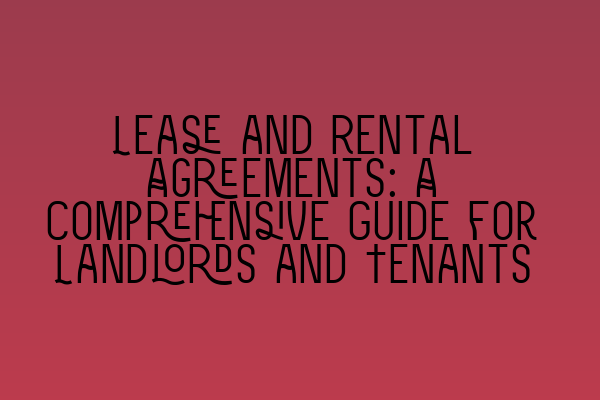Lease and Rental Agreements: A Comprehensive Guide for Landlords and Tenants
Lease and rental agreements are fundamental documents that govern the relationship between landlords and tenants. Whether you are a landlord looking to rent out your property or a tenant searching for a place to rent, understanding these agreements is crucial for a smooth and mutually beneficial arrangement. In this comprehensive guide, we will explore the key aspects of lease and rental agreements to help both landlords and tenants navigate this process with confidence.
The Basics of Lease and Rental Agreements
Lease and rental agreements outline the terms and conditions of the tenancy and serve as legal contracts between the landlord and tenant. These agreements establish the rights and responsibilities of both parties, detailing important information such as the duration of the tenancy, rental payment terms, and rules regarding the use of the property.
For landlords, having a well-drafted lease agreement is essential for protecting their property and ensuring a stable rental income. Tenants, on the other hand, rely on rental agreements to understand their rights and obligations as occupants of the property.
Key Elements of a Lease or Rental Agreement
Rental Term: The rental term specifies the duration of the tenancy, whether it’s a fixed term lease (usually for a set number of months or years) or a periodic tenancy (month-to-month or week-to-week).
Rent and Payment Terms: The agreement should clearly state the rent amount, when it is due, acceptable payment methods, and any additional charges or late fees.
Security Deposits: Landlords often require tenants to pay a security deposit upfront, which serves as protection against damages or unpaid rent. The agreement should outline the amount of the deposit and the conditions for its return at the end of the tenancy.
Property Use: The agreement should define the permitted use of the property, any restrictions on activities, and rules regarding guests, pets, or subletting.
Repairs and Maintenance: Both landlords and tenants have responsibilities to maintain the property. The agreement should specify who is responsible for repairs and how maintenance issues should be reported and addressed.
Termination and Renewal: The agreement should outline the process for termination, including notice periods required by both parties, as well as options for renewal or extension.
Seeking Professional Assistance
Creating a well-crafted lease or rental agreement can be a complex task, especially for those unfamiliar with legal jargon or specific local regulations. It is highly recommended to consult with a solicitor specializing in contract law to ensure the agreement accurately reflects the interests of both parties and complies with relevant laws and regulations.
At SQE Contract Law, our team of experienced solicitors can provide expert guidance on drafting, reviewing, and negotiating lease and rental agreements. With our in-depth knowledge of contract law and understanding of the unique considerations landlords and tenants face, we can help protect your rights and ensure a fair and enforceable agreement.
Click here to access SQE 1 Practice Exam Questions.
Click here to try out SQE 1 Practice Mocks FLK1 and FLK2.
Visit this link to learn more about our SQE 2 Preparation Courses.
Take a look at our comprehensive SQE 1 Preparation Courses.
Find out the latest SRA SQE Exam Dates for planning your studies effectively.
Whether you are a landlord or a tenant, understanding lease and rental agreements is vital for a successful tenancy. By familiarizing yourself with the key elements and seeking professional assistance when needed, you can ensure a fair and mutually beneficial arrangement for all parties involved. Click on the links above to discover additional resources and courses offered by SQE Contract Law to further enhance your legal knowledge.
